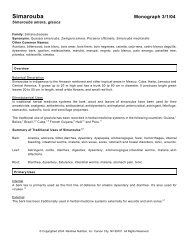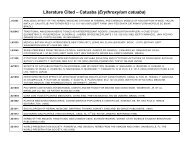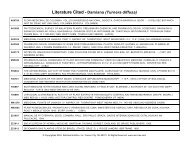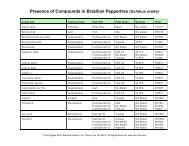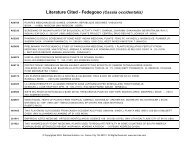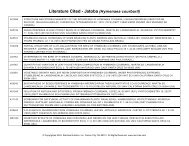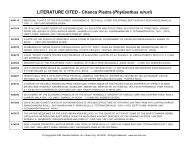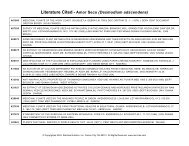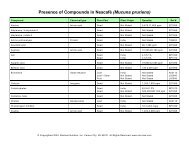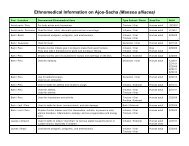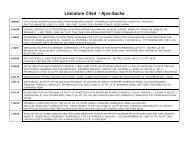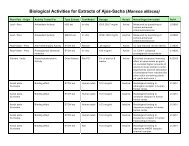Organ Specific Guide - Raintree Nutrition, Inc
Organ Specific Guide - Raintree Nutrition, Inc
Organ Specific Guide - Raintree Nutrition, Inc
Create successful ePaper yourself
Turn your PDF publications into a flip-book with our unique Google optimized e-Paper software.
AMAZON IMMUNE SUPPORT<br />
Description: A synergistic formula of 7 rainforest plants traditionally used in South America to support<br />
immune function.<br />
Traditional uses by organ or system: Immune/Lymphatic System: As an immunostimulant to enhance<br />
immune functions and immune cell production (T-cell, B-cell, NK-cell, and phagocytosis).<br />
Ingredients: A proprietary blend of cat’s claw (Uncaria tomentosa), anamu (Petiveria alliacea), mullaca<br />
(Physalis angulata), fedegoso (Cassia occidentalis), sarsaparilla (Smilax officinalis), samambaia (Polypodium<br />
decumanum), and macela (Achyrocline satureoides).<br />
Suggested Use: Take 2-3 capsules twice daily.<br />
Contraindications:<br />
• Not to be used during pregnancy, while breast-feeding or while seeking to become pregnant.<br />
• Do not use before or following any organ or bone marrow transplant or skin graft due to its immunotimulant<br />
properties.<br />
Drug Interactions: Will reduce the effect of immunosuppressive drugs. May potentiate ACE-inhibitors and<br />
antihypertensive medications.<br />
Other Practitioner Observations and Possible Precautions:<br />
• Several plants in this formula may reduce blood pressure. Those with hypotension, or those on medications<br />
to reduce blood pressure should be monitored more closely for this possible effect.<br />
Synopsis of research: (Please the online Tropical Plant Database for all cited research.)<br />
• Cat’s claw has been the subject of much research on its documented and patented immunostimulant<br />
actions. Many of these studies published from the late 1970s to early 1990s indicated that the whole<br />
oxindole alkaloid fraction (which included both POA and TOA alkaloids), whole vine bark and/or root bark<br />
extracts (which included all alkaloids), or six individually-tested oxindole alkaloids, when used in relatively<br />
small amounts, increased immune function by up to 50%. These study results were substantiated by<br />
Canadian researchers at the University of Ottawa (1999) and by Peruvian researchers (1998), both<br />
working with the whole vine extract (which included both TOA and POA alkaloids).<br />
• Anamu has been found in both in vivo and in vitro studies to be an immunostimulant. In a 1993 study with<br />
mice, a water extract stimulated lymphocytes and Interleukin II cell production. In the same year, another<br />
study with mice demonstrated that an anamu extract increased natural killer cell activity by 100% and<br />
stimulated the production of even more types of immune cells (Interferon, Interleukin II, and Interleukin<br />
IV). Additional research from 1997 to 2001 further substantiated anamu's immunostimulant actions in<br />
humans and animals.<br />
• Mullaca has been the subject of recent clinical research (which is still ongoing), based on the preliminary<br />
studies showing that it is an effective immune stimulant, is toxic to numerous types of cancer and<br />
leukemia cells, and that it has antimicrobial properties.<br />
• Fedegoso has been reported to have significant immunostimulant activity by increasing humoral<br />
immunity and bone marrow immune cells in mice, and protecting them from chemically-induced immunosuppression.<br />
• Flavonoids in sarsaparilla have been documented to have immune modulation and hepatoprotective<br />
activities. A U.S. patent was awarded in 2003 describing these flavonoids to be effective in treating<br />
autoimmune diseases and inflammatory reactions through their immunomodulating effects.<br />
• Samambaia has been clinically documented with immunomodulatory effects. It has shown to moderate<br />
proinflammatory cytokines responsible for inflammation processes as well as some of the specific<br />
immune modulating effects needed to treat the imbalances in the immune system that are peculiar to<br />
psoriasis.<br />
• Macela was reported to have a strong immunostimulant actions (increasing phagocytosis and immune<br />
cell activity) in humans and mice by researchers in Germany in the mid-1980s.



